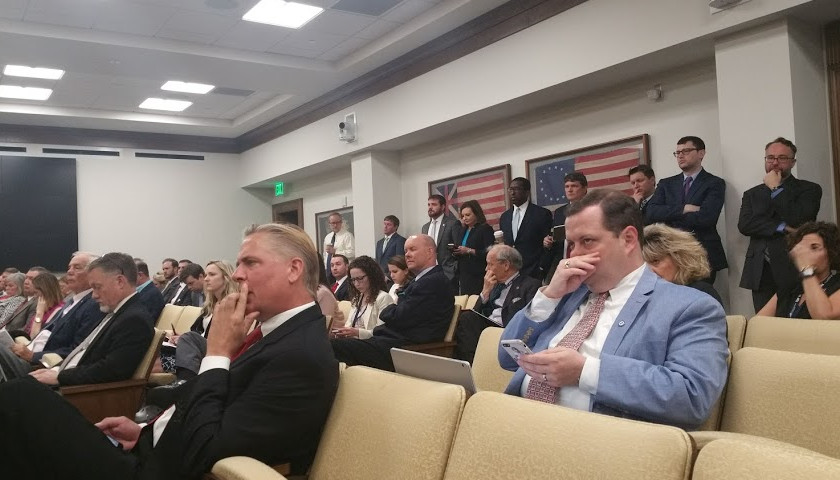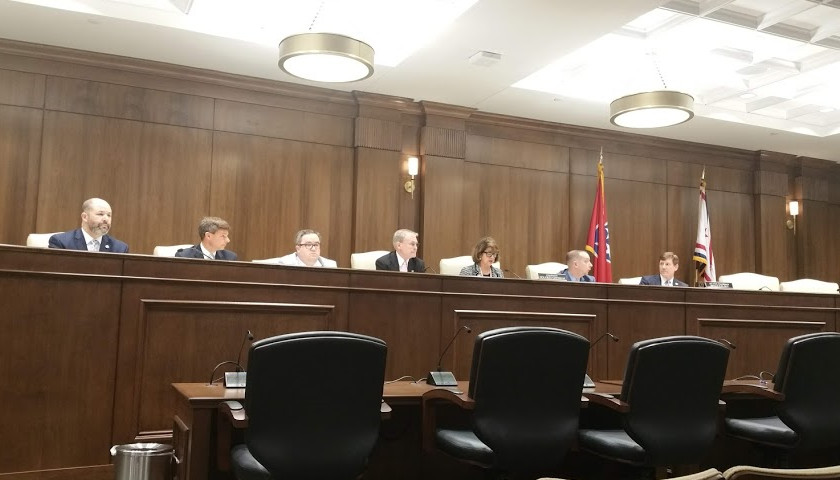NASHVILLE, Tennessee – Victory has finally been achieved for Governor Bill Lee’s Education Savings Accounts program, as both chambers of the Tennessee General Assembly finally adopted the same version of proposed legislation by narrow margins.
The final adoption of the Governor’s most significant education initiative, the Tennessee Education Savings Account Pilot Program Act, came with its share of wrangling.
After weeks of hearings on the legislation, carried by Speaker Pro Tem Bill Dunn (R-Knoxville) in the House and Senate Education Committee Chair Senator Dolores Gresham (R-Somerville), navigating the numerous committees and negotiating with the Administration, the two chambers eventually passed two different versions of the legislation last week.

Passage on the House floor, though, was drama filled as a 40-minute pause was taken in order to break a 49 to 49 tie by flipping the vote of Representative Jason Zachary (R-Knoxville) by taking Knox County out as one of the participating counties.
Following the refusal by both bodies of the Tennessee General Assembly to back away from their respective versions of the Education Savings Account bills HB 0939 and SB 0795, on Tuesday the Speakers each appointed five members to a Joint Conference Committee.
Senate members of the Joint Conference Committee included Senators Gresham, Brian Kelsey (R-Germantown), Jack Johnson (R-Franklin), Mike Bell (R-Riceville) and Raumesh Akbari (D-Memphis). House members included Representatives Bill Dunn (R-Knoxville), Matthew Hill (R-Jonesborough), Charlie Baum (R-Murfreesboro), Andy Holt (R-Dresden) and Rick Staples (D-Knoxville).
The Joint Conference Committee met Wednesday morning in Senate Hearing Room 1 before a relatively large crowd, given the early 8 a.m. meeting start time.
In addition to the 10 legislators in attendance due to their appointment to the Joint Conference Committee, there were another two dozen or so in the audience to observe the proceedings.
After the meeting was called to order, Chairman Gresham informed the Committee, “Those who have been on the issue for several years got together with counsel and put together a Committee Report that might be acceptable.”
Before reviewing the pre-prepared Committee Report, Senator Gresham requested that the Bonnie Wood with the Senate Office of Legal Services, took nearly 10 minutes to review the differences between House bill HB 0939 and Senate bill SB 0795 as passed.
ELIGIBLE STUDENTS
House – students zoned to attend an LEA (Local Education Agency) with three or more schools identified as priority schools in 2015 and had three or more schools in the bottom 10 percent in 2017, which equated to Davidson, Hamilton, Knox, and Shelby Counties and excluded Achievement School District (ASD)
Senate – students zoned to attend an LEA, excluding an ASD (Achievement School District) with 10 or more schools identified as priority schools in 2015, among the bottom 10 percent of schools in 2017 and identified as priority schools in 2018 or students zoned to attend an ASD, which would effectively be Davidson County, Shelby County and the ASD
PRIVATE SCHOOLS AND HOMESCHOOLING
House – required a parent to ensure provision of an education through enrollment in a Category I, II or III private school
Senate – required a parent to ensure provision of an education through enrollment in a Category I, II or III private school or through a home school operated under an umbrella program
VERIFICATION
House – required parent of a student under 18 or participating student if 18 or over to provide at least one of the documents under the E-Verify statute at the time of application
Senate – required the parent of a student under 18 years of age or the participating student if 18 or over to verify the student’s household income meets income requirements by providing documentation including, but not limited to, pay stubs, W-2 forms or income tax returns and to verify income at least once every three years and a student would cease to be eligible if they no longer met the income requirements.
STUDENT-ATHLETES
House – require that a participating student is ineligible to participate in sports sanctioned by an association that regulates interscholastic sports for the first year under certain circumstances
Senate – no language included
APPLICATION PROCESS
House – no language included
Senate – required the State Department of Education to establish an application process, to provide a timeline in which a parent or student must submit an application to participate in the program
ENROLLMENT CAPS
House – maximum enrollment in year one – 5,000; year two – 7,500; year three – 10,000; year four – 12,500; year five and thereafter – 15,000 students
Senate – maximum enrollment from any one LEA in year one – 5,000; year two and thereafter – 7,500; maximum – 15,000 students. Applications must reach 75 percent of enrollment cap before increasing to the next level.
ESA AWARD AMOUNT
House – maximum annual amount equal to per pupil state and local funds generated through the BEP (Basic Education Program funding formula)
Senate – maximum annual amount equal to per pupil state and local funds generated through the BEP, but must not exceed combined statewide average of required state and local BEP allocations. The State Department of Education is required to promulgate rules to calculate the statewide average.
SCHOOL IMPROVEMENT FUND
House – annual grants disbursed to LEAs for students enrolled for one year prior to participating in the program and generating BEP funds. Amount in year one is 75 percent, year two 50 percent, year three 25 percent of the amount awarded to participating students. Grants to LEAs with priority schools of 25 percent year one, 50 percent year two and 75 percent year three of ESA amount for participating students.
Senate – annual grants disbursed to LEAs for students enrolled for one year prior to participating in the program and generating BEP funds. The amount would be equal to the ESA amount for the first three years. After the first three years, the Department would disburse appropriations to the fund as grants for programs to support priority schools.
TESTING REQUIREMENTS
House – TCAP (Tennessee Comprehensive Assessment Program) test in math and English language arts as well as science in even numbered years and social studies in odd numbered years
Senate – TCAP test in math and English language arts
FRAUD
House – allowed the Department to refer for criminal prosecution if a person knowingly used ESA funds with the intent to defraud
Senate – not included
REPORTING REQUIREMENTS
House – State Department of Education to report to the General Assembly, to include a list of ELAs with at least one school in the bottom 5 percent and any recommendations
Senate – OREA to report to the General Assembly to include academic performance indicators from state tests, audit reports and any recommendations and required the Department of Education to assist OREA in the report
LEGAL
House – included 1) a provision local board of education did not have authority to assert a cause of action or to intervene in any cause of action challenging the legality of the ESA Act, 2) a severability clause stating that invalidity of any provision of the Act did not affect other provisions and that the provisions are severable, and 3) ESA is a state and local benefit, as defined by state code.
Senate – included a severability clause stating that invalidity of any provision of the Act did not affect other provisions and that the provisions are severable.
Senator Gresham recognized Senator Kelsey to hit the highlights of the Committee Report, which he said started with the House version as a base.

The Committee Report renames the bill – Tennessee Education Savings Account Pilot Program Act – to ensure that it is a pilot program limited to 10 or more priority schools in Davidson and Shelby counties and the ASD.
Student eligibility for the program would be established by showing household income qualification for Temporary Assistance for Needy Families (TANF), otherwise known as welfare, or for those who make more than TANF eligibility providing a valid, officially filed income tax return.
The next provision is a win-win for both urban and rural school districts, said Kelsey.
Instead of the House version that allocated 25 percent of the $25 million a year going to rural school districts in the first year and ratcheting up to 75 percent in year three, this would start off holding harmless the two districts in the pilot program.
The remainder of the money, rather than rolling over as in the Senate version, the remainder of the funds – which Senator Kelsey said will be significantly more than the 25 percent, especially in the first year – will be disbursed to those school districts with priority schools that are not in the pilot program.
At the end of the three years, said Kelsey, the money will also be sent throughout the state to all districts with priority schools.
Senator Kelsey further explained that the House language would be adopted for the participation caps and home schoolers will be excluded.
Through a question asked by Senator Bell, Senator Kelsey clarified that there are no strings attached to the funds distributed to rural schools.
Senator Akbari pointed out that that the Report is a 24-page document and inquired as to whether the Committee would have time to read it before voting on it.
Senator Gresham responded that there had been discussion and that Senator Kelsey did a really good job of pointing out the highlights, to which Senator Akbari responded, “I trust, but I like to verify.”
A roll call of the Senate members resulted in a 4 to 1 vote with Senators Bell, Gresham, Johnson and Kelsey voting Aye and Senator Akbari voting no.
Once the Senate members had finished their work, Representative Dunn took over and expressed his appreciation for the work done on the Conference Committee Report.
Representative Dunn said that with the review by legal, it seemed like the two versions were miles apart. In actuality, contended Dunn, the House and Senate both had the heart and soul of the bill which is for kids to have a better opportunity because there are some schools not performing for various reasons that he chose not to discuss.
Dunn’s take was that the differences “weren’t so much disagreement,” but that each body found something that the other did not.
Representative Staples asked who is responsible for regulating the pilot and if there is a sunset, to which Senator Kelsey responded that the program, by virtue of the it being limited to districts with 10 or more priority schools and the ASD, is a pilot program.
Kelsey continued that there is not a provision that ends the program, however, it does require stringent reporting through OREA (Office of Research and Education Accountability) of the Comptroller’s Office, considered more unbiased than the Department of Education that would otherwise run and evaluate the program.
After three years, it will be up to the General Assembly to appropriate funding for the program, explained Senator Kelsey, and the most effective way to end the program is to not appropriate for it.
Representative Baum questioned the removal of science and social studies testing from the House version.
Dunn said that the additional testing was added at the last minute on the Floor, which doesn’t discount them, but up until that time all efforts were zeroed in on math and English language arts testing.
Going on with his response, Dunn added that learning to read and math are done at a certain grade, but with science and social studies the learning is different at different grade levels. Dunn gave an example that this year, he understood that social studies testing was not administered in grades three through five and seemed to emphasize that a child’s ability to read and showing improvement in reading would also impact their reading of science and social studies.
Representative Holt pointed out that, in addition to the comments Dunn made, as he understands it, graduation rates, ACT scores and parent satisfaction will be tracked.
Representative and Deputy Speaker Matthew Hill inquired as to whether it is the belief of Senator Kelsey that the grant program for priority schools as established in the Conference Committee Report is anticipated to result in more funding for the rural districts than the House version to which Senator Kelsey responded, “Yes, it absolutely is.”
“I have studied these programs and their implementation in several states over the last 13 years. I can assure you that we will not reach the caps of this program.” Because of the challenge in getting the word out about this type of program, Senator Kelsey concluded, “I feel 100 percent confident that we will not reach those caps and that this language will actually end up with more money available for school districts outside of the two affected districts with priority schools than simply sending them 25 percent.”
Dunn added to that, “We’ve talked about that this is a pilot program, zeroed in on the areas where we have the largest need. But, I think we can also see, though maybe not stated in this document about this pilot program, during this whole discussion we’ve had many different groups, people, schools say ‘give us more money and we can improve.’ And, so, this aspect of it, this funding part where it’s going to go to people who have priority schools, there will also be a way to look at that and say, indeed, is spending more money going to get results. So, it’s almost a two-pronged pilot program. What happens when you give children educational choice so that they can find a different environment that meets their needs, but we’re also going to be able to see when we send millions of dollars to priority schools, what is done with it and what kind of results do you get there.”
With no additional comments or questions from the House, Dunn asked if there was a motion to accept the Conference Committee Report that was provided. The motion was made by Representative Holt and seconded by Representative Staples. The second by Staples was met with a gasp from the back of the room, which seemed to come from fellow Democrat Representative Bo Mitchell of Nashville.
On a voice roll call, the vote of the House members was unanimously in favor of the Conference Committee Report.
As the Committee was about to adjourn after approximately 30 minutes, which followed months of debate, negotiation and revision on the initiative, Senator Gresham thanked the Committee members and said each member will be asked to sign the Conference Committee Report.
She also took a minute to express a few final remarks, “I want to say to all of you,” at first looking toward the House members, “and to the Senate members as well and to the other folks in the House, this did not happen in a vacuum. We talk to each other all the time, and there has been such a great give and take, even between the House and Senate as well as internally with our individual members. So, I congratulate you, I applaud you and thank you for your willingness to collaborate,” pausing and seeming to be moved by the experience, “and I will remember this for a long time. Thank you so much.”
Following the Joint Conference Committee adjournment, media immediately swarmed Representative Staples seemingly incredulous that he would have seconded the motion to adopt the Report and then go on to vote to accept it.
Representative Holt, who has been a strong advocate for the ESA program, told The Tennessee Star at the conclusion of the Joint Conference Committee, “I think today is a turning point potentially in the State of Tennessee as it relates to education. I think the institution of this pilot program will hopefully bring about monumental changes in two specific counties that were identified in the Conference Committee Report that was brought before us today.”
“In essence, what we’re doing for the first time since I’ve been elected and I think really in the first time in the State of Tennessee, is trying to engage market principles into the process of education.”
“In my opinion, this is the out-of-the-box-thinking solution that will ultimately provide not just a new process for education for these particular students, but provide a new process to bring about education reform all across the state. When we look at the opportunity for students who are right now, literally, being neglected as it relates to their education, this brings about a whole new potential process to alleviate that literal educational, I hate to use the word suffering, but I think in essence it might be an applicable term.”
“I’m really proud to have sat on this Conference Committee. I’m proud of the product and result of the Conference Committee and I look forward to later today passing this legislation in both chambers.”
A House Floor session was scheduled for shortly after the conclusion of the Joint Conference Committee. Despite the legislation having been discussed and voted on just the week before and nearly two dozen House members being present during the Joint Conference Committee, the Report was debated for the better part of an hour, much of which was dispelling misinformation about what the legislation will do.
The Conference Committee Report, receiving a Constitutional majority with 51 Ayes and 46 Noes was adopted by the House.
Representatives voting aye were: Charlie Baum (R-Murfreesboro), Clark Boyd (R-Lebanon), Mike Carter (R-Ooltewah), Scott Cepicky (R-Culleoka), John Crawford (R-Kingsport), Michael Curcio (R-Dickson), John DeBerry (D-Memphis), Clay Doggett (R-Pulaski), Bill Dunn (R-Knoxville), Rick Eldridge (R-Morristown), Jeremy Faison (R-Cosby), Andrew Farmer (R-Sevierville), Johnny Garrett (R-Goodlettsville), Mark Hall (R-Cleveland), Patsy Hazlewood (R-Signal Mountain), Esther Helton (R-East Ridge), Matthew Hill (R-Jonesborough), Timothy Hill (R-Blountville), Andy Holt (R-Dresden), Dan Howell (R-Georgetown), Bud Hulsey (R-Kingsport), Chris Hurt (R-Halls), Curtis Johnson (R-Clarksville), “Doc” Kumar (R-Springfield), Justin Lafferty (R-Knoxville), William Lamberth (R-Portland), Tom Leatherwood (R-Arlington), Mary Littleton (R-Dickson), Susan Lynn (R-Mt. Juliet), Pat Marsh (R-Shelbyville), Debra Moody (R-Covington), Jerome Moon (R-Maryville), Dennis Powers (R-Jacksboro), John Ragan (R-Oak Ridge), Jay Reedy (R-Erin), Tim Rudd (R-Murfreesboro), Iris Rudder (R-Winchester), Bill Sanderson (R-Kenton), Jerry Sexton (R-Bean Station), Paul Sherrell (R-Sparta), Robin Smith (R-Hixson), Mike Sparks (R-Murfreesboro), Bryan Terry (R-Murfreesboro), Rick Tillis (R-Lewisburg), Chris Todd (R-Madison County), Micah Van Huss (R-Jonesborough), Mark White (R-Memphis), Ryan Williams (R-Cookeville), Dave Wright (R-Corryton), Jason Zachary (R-Knoxville) , Mr. Speaker Casada (R-Franklin)
Representatives voting no were: Bill Beck (D-Nashville),Rush Bricken (R-Tullahoma), David Byrd (R-Waynesboro), Kent Calfee (R-Kingston), Karen Camper (D-Memphis), Dale Carr (R-Sevierville), Jesse Chism (D-Memphis), John Ray Clemmons (D-Nashville), Mark Cochran (R-Englewood), Jim Coley (R-Bartlett), Barbara Cooper (D-Memphis), Vincent Dixie (D-Nashville), Bob Freeman (D-Nashville), Ron Gant (R-Rossville), Bruce Griffey (R-Paris), Yusuf Hakeem (D-Chattanooga), Curtis Halford (R-Dyer), G. A. Hardaway (D-Memphis), Kirk Haston (R-Lobelville), David Hawk (R-Greeneville), Gary Hicks (R-Rogersville), Jason Hodges (D-Clarksville), John Holsclaw (R-Elizabethton), Darren Jernigan (D-Nashville), Gloria Johnson (D-Knoxville), Kelly Keisling (R-Byrdstown), London Lamar (D-Memphis), Harold Love (D-Nashville), Larry Miller (D-Memphis), Bo Mitchell (D-Nashville), Antonio Parkinson (D-Memphis), Jason Potts (D-Nashville), Jason Powell (D-Nashville), Bob Ramsey (R-Maryville), Lowell Russell (R-Vonore), Cameron Sexton (R-Crossville), Johnny Shaw (D-Memphis), Rick Staples (D-Knoxville), Mike Stewart (D-Nashville), Dwayne Thompson (D-Cordova), Joe Towns (D-Memphis), Ron Travis (R-Dayton), Kevin Vaughan (R-Shelby County), Terri Lynn Weaver (R-Lancaster), Sam Whitson (R-Franklin), John Mark Windle (D-Livingston)
The Senate took up the Conference Committee Report during its marathon Floor session Wednesday that began early afternoon. The Report, having received a Constitutional majority with 19 Ayes and 14 Nays was adopted by the Senate.
After a long battle that extends prior to this legislative session and beyond the General Assembly, proponents of school choice responded to the success.
Senator Brian Kelsey, an integral part and strong advocate for the initiative who shared his own personal school choice experience as a child as the legislation worked its way through the Senate, issued a statement after final passage of the Tennessee Education Savings Account Pilot Program Act:
“Thirteen years ago I first introduced a private school choice bill in the Tennessee legislature to help low-income children receive a quality education. In 2011 and again in 2014, it passed the Senate, but I must admit there were days when I never thought I would see it become law. Today it heads to the governor’s desk for his signature. I want to thank the tireless work and support of the bill sponsors, Senators Dolores Gresham and Jack Johnson, and Lt. Governor Randy McNally; Representatives Bill Dunn, Matthew Hill, and House Speaker Glen Casada; President Donald Trump for tweeting his encouragement; and most of all Governor Bill Lee for campaigning for school choice and for having the courage to present his bill to the legislature for passage.
Thousands of low-income children will no longer be stuck in failing schools but will have the chance they deserve for a quality education.”
The Beacon Center of Tennessee, a non-profit, nonpartisan, independent organization that empowers Tennesseans to reclaim control of their lives so that they can freely pursue their version of the American Dream by providing concerned citizens and public leaders with expert empirical research and timely free market solutions to public policy issues in Tennessee, favors school choice options.
In response to the passing of the program, Beacon CEO Justin Owen stated, “We are thrilled that Tennessee has finally decided to give parents a choice over their child’s education. We want to thank Governor Lee for his leadership and the legislature for passing this bill into law. This is a huge step in the long fight to provide all children with the quality education they deserve, and we will never give up the fight to extend that opportunity to every child in this state.”
Shaka Mitchell, Executive Director at the Tennessee Federation for Children, commented, “Today’s vote marks a historic victory for students in Tennessee. Members of the House and Senate voted to open doors for children who have been trapped in failing schools for far too long. They voted to rightly give families choice when it comes to their child’s education. They voted to set children on a path to success.”
“This victory would not have been possible without the leadership and vision of Governor Lee, Lieutenant Governor Randy McNally, and House Speaker Glen Casada. These leaders championed a bold proposal that will help thousands of students find the education that is right for them and improve the state’s education system as a whole.
We commend them, Senate Majority Leader Jack Johnson, Speaker Glen Casada, House Majority Leader William Lamberth, Chairman Dolores Gresham, Chairman Mark White, Representative Bill Dunn, and many other legislators for their steadfast commitment and for standing resolutely on the side of Tennessee’s students and families.”
Not all parties were as positive on the news.
J.C. Bowman, Executive Director of Professional Educators of Tennessee, issued the following statement: The Tennessee General Assembly today voted to support a second Education Savings Account type program. The legislation which passed today will serve up to 15,000 lower-income students in Nashville and Memphis, after five years. It will very likely face legal challenges. Education policy must support all children in developing the skills, the knowledge, and the integrity that will allow them to be responsible, contributing members of their community and ultimately gain employment with a sustainable living wage. Public education still provides the best opportunity for most children to obtain that success. We do not envision this limited pilot program changing that fact. The vast majority of our schools are incredibly successful, as are the teachers who serve and students who attend them.
Tennessee Star Political Editor, Steve Gill, offered another perspective, “After years of coming up short, the proponents of school choice finally got across the goal line and will now have the opportunity to show what a little innovative thinking can do to help students in the worst education environments in the state. It is a big win for Governor Bill Lee, who made this his top legislative priority. But the biggest winners may be the students who have a fresh chance at success and the opportunity to break out of a system that has left them behind for way too long.
“The teachers’ union pulled out all the stops to roadblock the legislation, and while legislators who have been firmly in their pockets for a while stuck by them, a few others took the bold step of focusing on the children rather than union talking points and cast the critical votes that made passage possible. Hopefully, the results in the coming years will provide the proof that the dramatic moments that surrounded getting the bill passed were worth the time and arm-twisting that was required.”
The video of the Joint Conference Committee on HB 0939 / SB 0975 can be viewed here.
The Conference Committee Report on HB 0939 / SB 0795 can be read here.
– – –
Laura Baigert is a senior reporter at The Tennessee Star.





